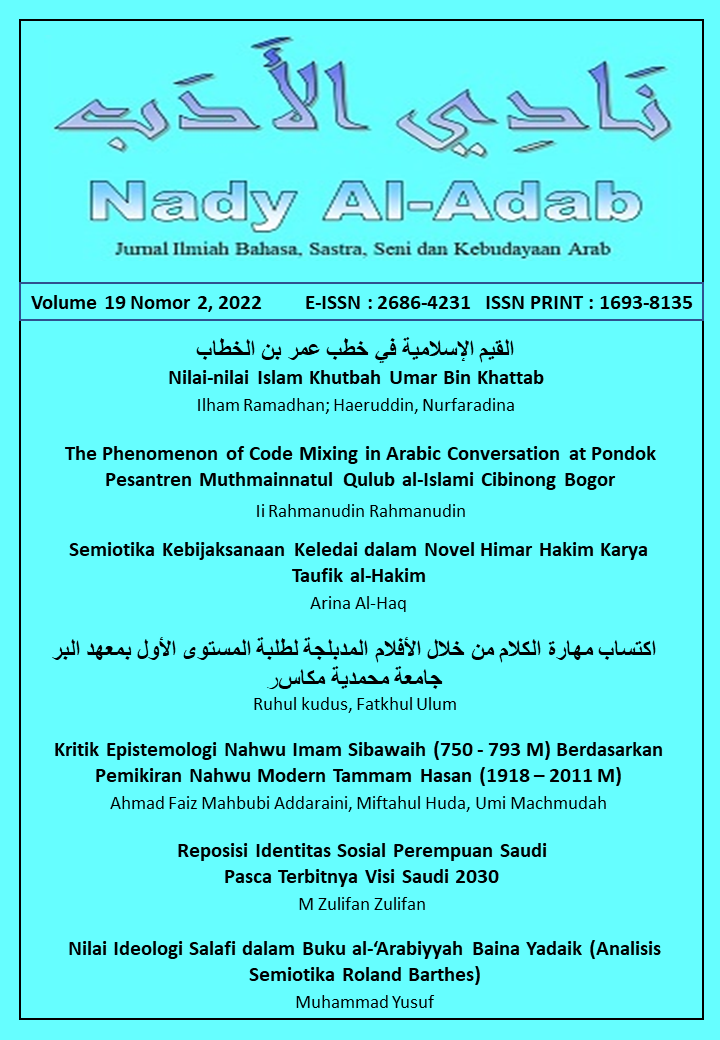Reposisi Identitas Sosial Perempuan Saudi Pasca Terbitnya Visi Saudi 2030
DOI:
https://doi.org/10.20956/jna.v19i2.23510Abstract
Abstract This study examines the social and cultural changes of Saudi Arabian society and their impact on women after the launch of Saudi Vision 2030 by Muhammad Bin Salman (MBS). Saudi Arabian women were previously positioned in the domestic sphere with strict restrictions not to participate in the public sphere. However, as a consequence of the economic liberalization program, MBS offers fresh air to change gender relations in Saudi Arabian society by opening public spaces for women to contribute. This qualitative research utilizes the information obtained through social media in Saudi Arabia to be critically studied by placing it as a discourse (discourse). Foucault's theory of Critical Discourse Analysis (1980) is used as an analytical knife to examine social changes in women in Saudi Arabia driven by royal actors who have so far limited women's position. This study found a change in the social and political roles of women in the Kingdom of Saudi Arabia after the Saudi Vision 2030 was launched. The change is a consequence of the openness designed power (MBS). The kingdom no longer places civil society as an object, but as a subject of development. Keywords: Saudi Arabia; Saudi Vision 2030; Women; Social Identity.Downloads
References
Al-Bakr, F., Bruce, E. R., Davidson, P. M., Schlaffr, E., & Kropiunigg, U. 2017. Empowered but not Equal: Challenging the Traditional Gender Roles as Seen by University Students in Saudi Arabia. FIRE: Forum for International Research in Education, 4(1). http://preserve.lehigh.edu/fie/vol4/iss1/3
Al-Namlah, Hamad Ali. (tt). Women’s Rights in Saudi Arabia: The Impact of Women 2 Drive Movement. Eastern Michigan University, Ypsilanti MI, USA
Al-Ruwaili, Mamdouh Dawish. 2020. Females and sport in Saudi Arabia: An analysis of the relationship between sport, region, education, gender, and religion. University of Stirling.
BP (Statistical Review of World Energy). 2002. London: BP Amoco p.l.c., diakses 1 26 Maret 2021.
Cerioli, Luiza. 2019. Driving In The Middle Of The Road: Paradoxes Of Womens Role Under The New Saudi Arabian Nationalism. DH Center for Near and Middle Eastern Studies (CNMS) at the University of Marburg, 35037 Marburg — Hessen, Germany.
Erturk, Yakin. 2009. Report of The Special Rapporteur on Violence Against Women, Its Cause and Consuquences, New York, Human Right Council (HRC).
Eriyanto. 2001. Analisis Wacana Pengantar Analisis Teks Media. Yogyakarta: LKIS Pelangi Aksara.
Foucault, Michel. 2002. Power Knowledge: Wacana Penguasa/Pengetahuan. Terj. Yudi Santoso. Yogyakarta: Bentang Budaya.
Foucault, Michel. 1982. The Subject and Power. In The Essential Foucault. New York: The New Press.
Foucault, Michel. 1978. Governmentality. In The Essential Foucault. New York: The New Press.
Haryatmoko. 2006. Membongkar Rezim Kepastian; Pemikiran Kritis Post-Strukturalis. Yogyakarta: Kanisius.
Journiette, Irina Bernebring. 2014. Negotiating Identity in the Kingdom, A Conversation with Five Young Saudi Arabia (Master thesis). Department of Theology, Uppsala Universitet.
Kamal, M. Syaiful. 2019. Perempuan, Teologi, dan Kekuasaan (Relasi Diskursif antara Kuasa dan Kebijakan atas Perempuan Arab Saudi). Tesis S2 Program Magister Interdisciplinary Islamic Studies Universitas Islam Negeri (UIN) Sunan Kalijaga Yogyakarta.
Khadhar, Fouzah. 2018. Liberation, patriarchal practices and women’s use of violence in the domestic setting in Saudi Arabia (Ph.D Thesis). Nottingham Trent University
Kinninmont, Jane. 2017. Vision 2030 and Saudi Arabia’s Sosial Contract Austerity and Transformation. Chatam House, The Royal Institute of International Affair.
Kingdom of Saudi Arabia, Council of Economic and Development Affairs of Saudi Arabia .2016. ‘Saudi Vision 2030’, April 2016,
http://vision2030.gov.sa/en
Rachman, Muhammad Fauzi Abdul. 2019. Th Reality behind the Rhetoric: an Examination of Saudi Vision 2030 Using Imminent Critique. Islamic World and Politics Vol. 3. No. 2, December 2019 ISSN: 2614-0535, E-ISSN: 2655-1330
Van Geel, Annemarie. 2012. Whither the Saudi Woman? Gender Mixing, Empowerment and Modernity, dalam Saudi Arabia Between Conservatism, Accommodation And Reform, Roel Meijer and Paul Aarts (editors), Netherlands Institute of International Relations ‘Clingendael. http://www.clingendael.nl
Wagemakers, Joas. 2012. Arguing for Change under Benevolent Oppression: Intellectual Trends and Debates in Saudi Arabia, dalam Saudi Arabia Between Conservatism, Accommodation And Reform, Roel Meijer and Paul Aarts (editors), Netherlands Institute of International Relations ‘Clingendael’. http://www.clingendael.nl
Sumber Website Media:
Amnesty International. (2018). Driving ban and the Women2Drive movement, https://www.amnesty.ca/news/driving-ban-and-women2drive-movement. [Diakses 3 Maret 2022].
Jamjoom, Mohammed. (2013). CNN: Saudi clerics warns driving could damage women’s ovaries, https://edition.cnn.coM/2013/09/29/world/meast/saudi-arabia-women- driving-cleric/index.html. [Diakses 26 Februari 2022].
Al-Arabiya.net. (2021). Saudi Arabia opens military recruitment to women in latest move for inclusivity . https://english.alarabiya.net/News/gulf/2021/02/21/Saudi-Vision-2030-Saudi-Arabia-opens-military-recruitment-to-women-in-latest-move-for-inclusivity- [Diakses 7 Maret 2022].
Arab News. (2015). King Salman issues decree allowing women to drive in Saudi Arabia,https://www.arabnews.com/node/1167916/saudi-arabia. [Diakses 6 Maret 2022].
Al-Arabiya.net. (2018). Saudi women to start own business without male permission https://english.alarabiya.net/News/gulf/2018/02/18/Saudi-women-to-start-own-business-without-male-permission [Diakses 3 Maret 2022].
Al-Arabiya,net. (2018). Saudi Arabia announces date for women to take driver’s seat https://english.alarabiya.net/News/gulf/2018/05/08/Saudi-Arabia-announces-date-for-women-to-taking-drivers-seat [Diakses 8 Maret 2022[.
Al-Arabiya.net. (2021). Saudi Arabia opens military recruitment to women in latest move for inclusivity . https://english.alarabiya.net/News/gulf/2021/02/21/Saudi-Vision-2030-Saudi-Arabia-opens-military-recruitment-to-women-in-latest-move-for-inclusivity-[Diakses 7 Maret 2022].
BBC.com.(2022) Saudi women should not have to wear abaya robes, top cleric says. https://www.bbc.com/news/world-middle-east-43017148 [Diakses 4 Juni 2022].
Dw.com. (2022)Saudi Arabia: Prince says women should decide whether to wear robes, face veils.https://www.dw.com/en/saudi-arabia-prince-says-women-should-decide-whether-to-wear-robes-face-veils/a-43043071 [Diakses 3 Juni 2022].
ForeignPolicy.com (2019). Mohammed bin Salman’s Fake Anti-Extremist Campaign. https://foreignpolicy.com/2019/06/13/mohammed-bin-salmans-fake-anti-extremist-campaign/ [Diakses 12 September 2022].
Reuters.com. (2021).Saudi Arabia reshuffles military, promotes woman at labor ministry https://www.reuters.com/article/us-saudi-government-idUSKCN1GA2P3 [Diakses 2 November 2021].
Salman, Mohammad bin. (2016). Visi Saudi 2030. https://www.vision2030.gov.sa/en file:///C:/Users/User-PC3/aku%20Disertasi%20Bro/Saudi_Vision2030_EN.pdf. [Diakses 3 Maret 2022].
Saudiembassy.net. (2022) Princess Reema bint Bandar bin Sultan bin Abdulaziz Al Saud. https://www.saudiembassy.net/ambassador [Diakses 2 September 2022].
SPA.Gov.SA. (2022). 26 Saudi women work as air traffic controllers in the Kingdom's airports. https://www.spa.gov.sa/viewfullstory.php?lang=en&newsid=2046541 [Diakses 7 Juni 2022].
Downloads
Published
How to Cite
Issue
Section
License

This work is licensed under a Creative Commons Attribution-NonCommercial 4.0 International License.
All right reserved. The articles in this journal are under copyright of journal Nady al-Adab and the author of the article. No part of the articles may be reproduced without permission of the journal management



















